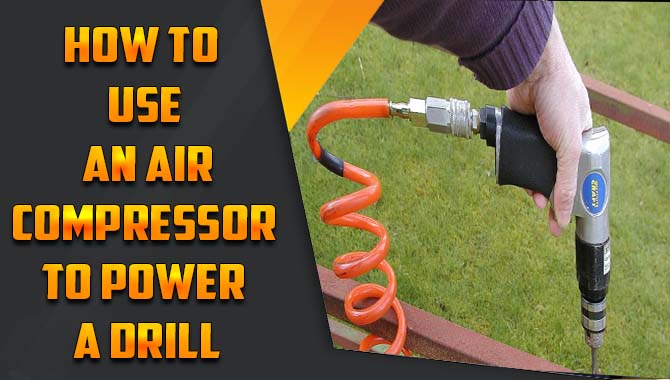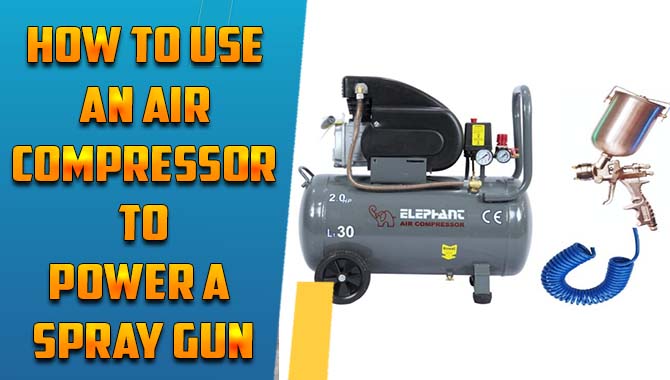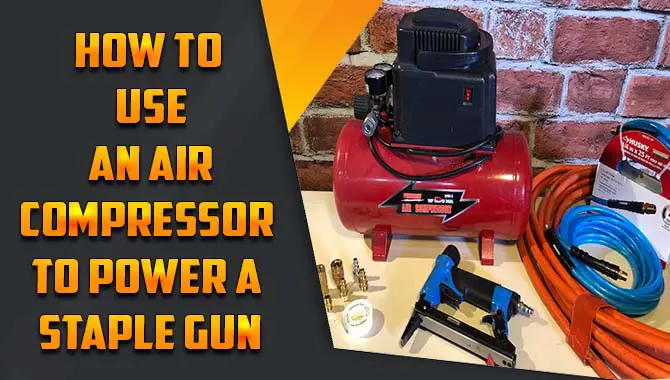An air compressor is a versatile tool that can be used for a wide range of applications. From inflating tires to powering pneumatic tools, an air compressor can make many tasks easier and more efficient.
Air compressors are essential for many professionals, including contractors and mechanics. How to the right air compressor tank size can be critical to ensuring efficient and effective performance.
A larger tank will allow for longer periods of use before needing to refill, while a higher horse power motor will provide more power for demanding applications. We’ll cover top tips for selecting the right air compressor and how to use it effectively once you’ve made your choice.
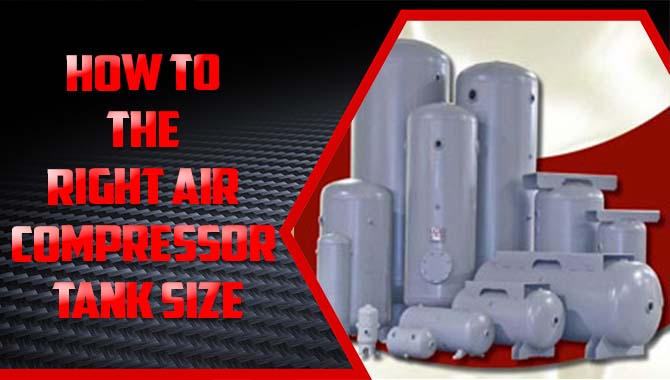
How To The Right Air Compressor Tank Size: 5 Steps
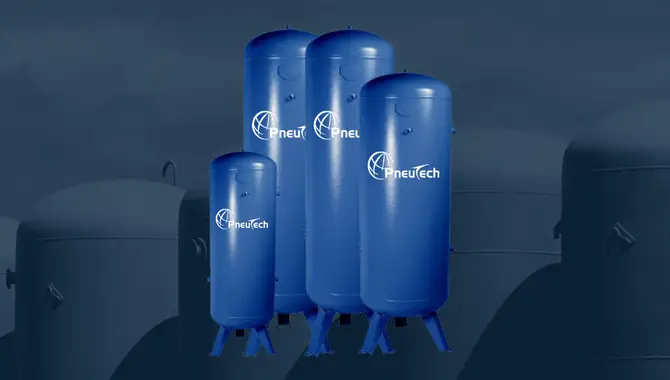
Choosing the right air compressor tank size can make a big difference in the efficiency and effectiveness of your air tools. By following these steps, you can ensure that you choose the right air compressor tank size for your specific air tool needs. Here are 5 steps to help you determine the right size for your needs:
- Consider your tool requirements: Determine the CFM (cubic feet per minute) and PSI (pounds per square inch) requirements of the tools you will be using with the air compressor.
- Calculate required storage capacity: Multiply the CFM requirement by the amount of time you want to run your tools between compressor cycles. This will give you the required storage capacity in cubic feet.
- Adjust for pressure drop: Account for any pressure drop that may occur between the compressor and the tool by adding an additional 25% to your calculated storage capacity.
- Choose a tank size: Look for a tank size that meets or exceeds your calculated storage capacity.
- Consider portability: Keep in mind that larger tanks may be less portable, so consider whether you need a more portable option or if a larger tank is more important for your specific needs.
What Size Air Compressor Do I Need?
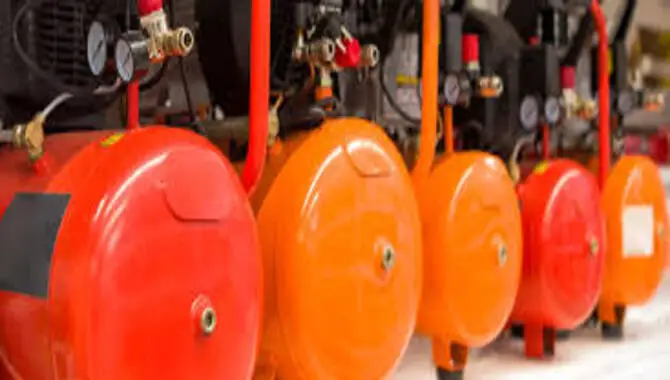
The size of air compressor you need depends on the type and frequency of tools you’ll be using. For example, a small tank size of 1-6 gallons is suitable for light-duty tasks such as inflating tires or powering a nail gun. A medium-sized 6-30 gallons tank can handle heavier tasks like sanding, grinding, and spraying.
Meanwhile, large tanks over 30 gallons are ideal for continuous, heavy-duty tasks like operating pneumatic jackhammers or sandblasters. Remember that choosing a larger tank size provides longer run times but may also come with increased weight and portability restrictions, so it’s important to consider your specific needs before deciding.
Factors To Consider For Physical Dimensions And Storage Space
When selecting the right air compressor tank size, don’t forget to consider physical dimensions and storage space. The type of tools you’ll use and how often you’ll use them are also important factors. A good rule of thumb is to choose a tank size of at least 20 gallons for most DIY projects.
For commercial or industrial use, a larger tank size may be necessary to provide the required compressed air volume. Make sure to properly size your air compressor by considering all the above factors for efficient performance.
Air Tool Types And CFM Requirements
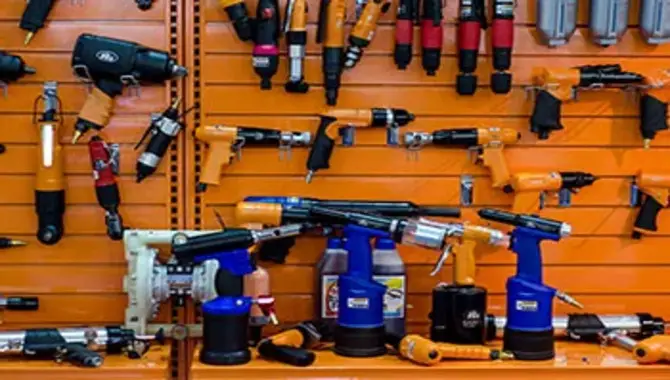
Choosing the right size air compressor for your application requires careful consideration of factors like required cfm rating, psi, and duty cycle. In general, it is suggested to pick an air compressor with a tank size of at least twice the needed cfm rating.
Consultation with professionals or thorough research could help you find the right size air compressor. Other factors that impact air compressor sizing are hose length and diameter, airflow requirements for specific tools like nail guns or grinders, horsepower, receiver tank configuration in accordance with compressed air usage patterns, etc.
Pressure (PSI) And Its Impact On Compressor Performance
To pick the right air compressor size, you must consider its pressure (PSI) in addition to other factors. In order to select an appropriate size, calculate the necessary cubic feet per minute (CFM) and pressure requirement of your air tools. After that, factor in the duty cycle and storage tank capacity when selecting an air compressor.
It is recommended to choose an air compressor with a higher CFM and PSI rating than what your tools require. Making a mistake in sizing may result in poor operation, inefficiency, or harm to your equipment.
The Role Of Tank Size/ Air Capacity In Compressor Selection
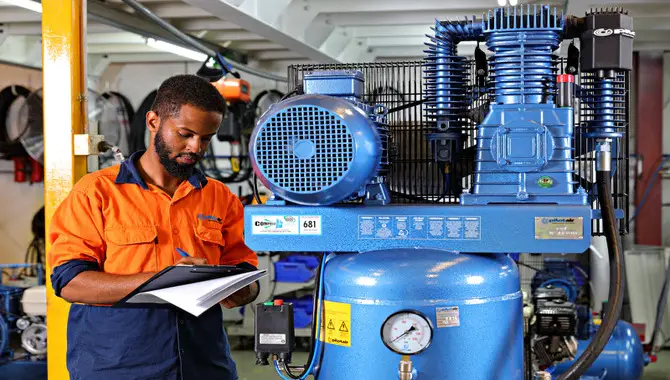
Selecting the right air compressor size involves multiple factors, including the tank size or air capacity. To determine which size is right, consider your specific usage requirements and the tools you will use.
Calculate each tool’s CFM requirement accurately in cubic feet per minute, whether it’s a nail gun or an impact wrench. While a 20-gallon tank suffices for DIY projects, a larger tank of around 60 gallons would be more appropriate for professional use.
Power Supply Options: Which Is Right For Your Needs?
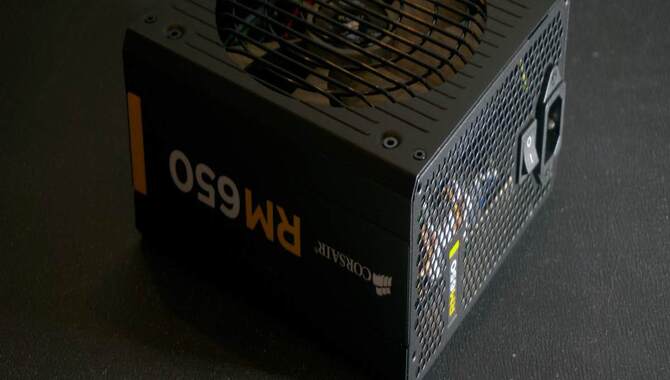
When selecting an air compressor, it’s also important to consider power supply options. You can opt for an electric or gas-powered compressor depending on your specific needs. An electric compressor may be more appropriate for indoor use as it produces less noise and fumes.
However, if you’re working in remote locations or areas without electricity, a gas-powered option may be better. No matter your needs, choose a power supply option that meets your usage requirements and safety guidelines.
Understanding The Importance Of Horsepower (HP)
When choosing an air compressor, understanding the importance of horsepower (HP) is crucial. The minimum required compressor size can be determined by checking the CFM requirement of your tools. For light-duty tasks like using a nailery or paint sprayer, a smaller portable air compressor with a gallon capacity of 20 or more might be enough.
However, for heavier projects like automotive repair that require higher cfm ratings, you should consider investing in a larger tank size with greater cubic feet per minute and pounds per square inch ratings. Choosing an air compressor with sufficient horsepower to meet your needs and ensure efficient performance without compromising on quality is important.
Factors To Consider For Noise And Vibration Levels
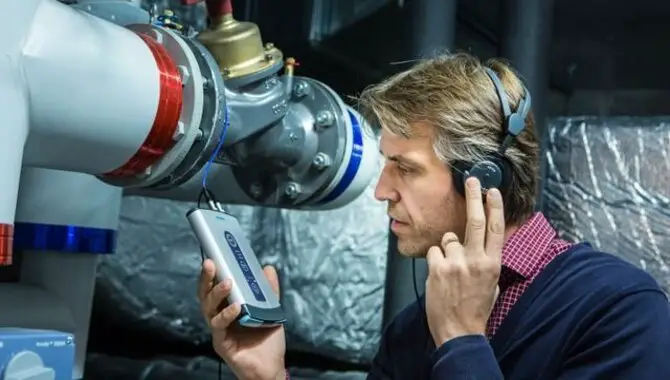
When selecting the right air compressor, it’s important to consider factors such as the tools you’ll be using, frequency of use, and your specific noise and vibration levels requirements. For most home garage applications, a 30-gallon tank is suitable.
However, larger tanks may be needed for industrial settings. To accurately determine the appropriate tank size, consult an expert or refer to manufacturer recommendations. Don’t forget also to consider secondary key terms such as compressor size, cfm rating, psi, horsepower, storage tank, power supply, nail gun, and more.
Top Tips For Selecting The Right Air Compressor
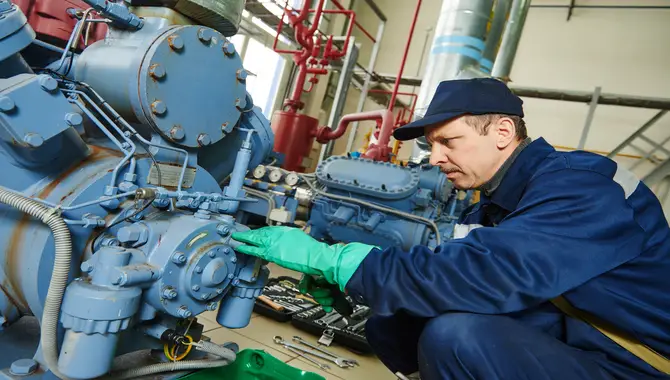
To select the right air compressor for your needs, it’s important to consider various factors apart from just its tank size. Evaluate the tools you’ll use with the compressed air and their cfm requirements. Evaluate portability features like wheels or handles if you need a portable air compressor.
Noise levels also significantly affect selecting an appropriate air compressor system for your workspace or home garage applications. Additional features like oil-free operation or safety features should also factor into deciding which air compressor to buy.
How To Use Your Compressor Effectively
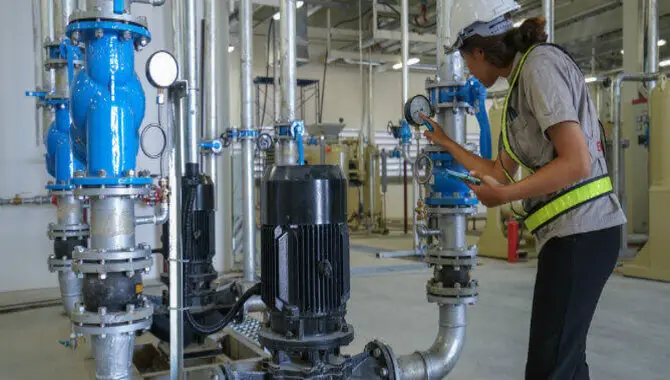
To effectively use your air compressor, consider the specific requirements of your air tools when selecting a tank size. Additionally, consider how often you’ll use the compressor before determining the required tank size.
It’s essential that your compressor’s cubic feet per minute (CFM) rating meets or exceeds your tool’s needs. Proper maintenance is also crucial for longevity and effectiveness. Don’t forget to regularly clean and change the oil.
Conclusion
Selecting the right air compressor tank size ensures your equipment performs at its best. It is crucial to consider factors such as CFM requirements, PSI, power supply options, and physical dimensions while selecting.
Additionally, using your compressor effectively by keeping it well-maintained and regularly inspecting it can prolong its lifespan and save you money in the long run. Choosing the right air compressor tank size is an important decision that can impact the efficiency and effectiveness of your tools.
It’s crucial to consider your specific needs, such as the frequency and duration of use, and select a tank size that can meet those demands. Remember to also consider any future growth or changes in your workload. By following these guidelines, you can make an informed decision and ensure that how to the right air compressor tank size will be a valuable investment for years to come.
Frequently Asked Questions:
1.What Is The Best Air Compressor For A Certain Size Of Tank?
Ans: Choosing the best air compressor for a tank depends on usage and needs. For smaller tanks, a lower horsepower portable compressor is suitable. Larger tanks may require higher horsepower compressors with more CFM output. Consider usage frequency, purpose, and budget when selecting an air compressor for a specific tank size.
2.What Is The Difference Between Portable And Stationary Air Compressors?
Ans: The main difference between portable and stationary air compressors is their mobility. Stationary compressors are larger with higher capacity, while portable ones are lighter and more compact. Choosing the right type depends on your specific requirements and usage patterns.
3.How Much Does An Air Compressor Cost?
Ans: The price of an air compressor depends on its size, features, and brand. Portable ones cost around $100-$500, while industrial models can be thousands of dollars. Additional features like oil-free pumps or quiet operation increase the cost. Consider long-term benefits and savings when choosing one.
4.Is A Larger Air Compressor Tank Always Better For My Needs?
Ans: The ideal air compressor tank size depends on your usage and project needs. While a larger tank can provide longer run times, it adds weight and bulk to the unit. Consider your frequency of use and specific needs before deciding on the right size.
5.How Can I Calculate My Project Or Application’s Required Air Compressor Tank Size?
Ans: To determine your project’s air compressor tank size, calculate the CFM and PSI requirements and multiply them to get the total air volume needed. Choose a tank size that can hold at least the required volume, with some extra capacity for safety and efficiency.

I am passionate about home engineering. I specialize in designing, installing, and maintaining heating, ventilation, and air conditioning systems. My goal is to help people stay comfortable in their homes all year long.
